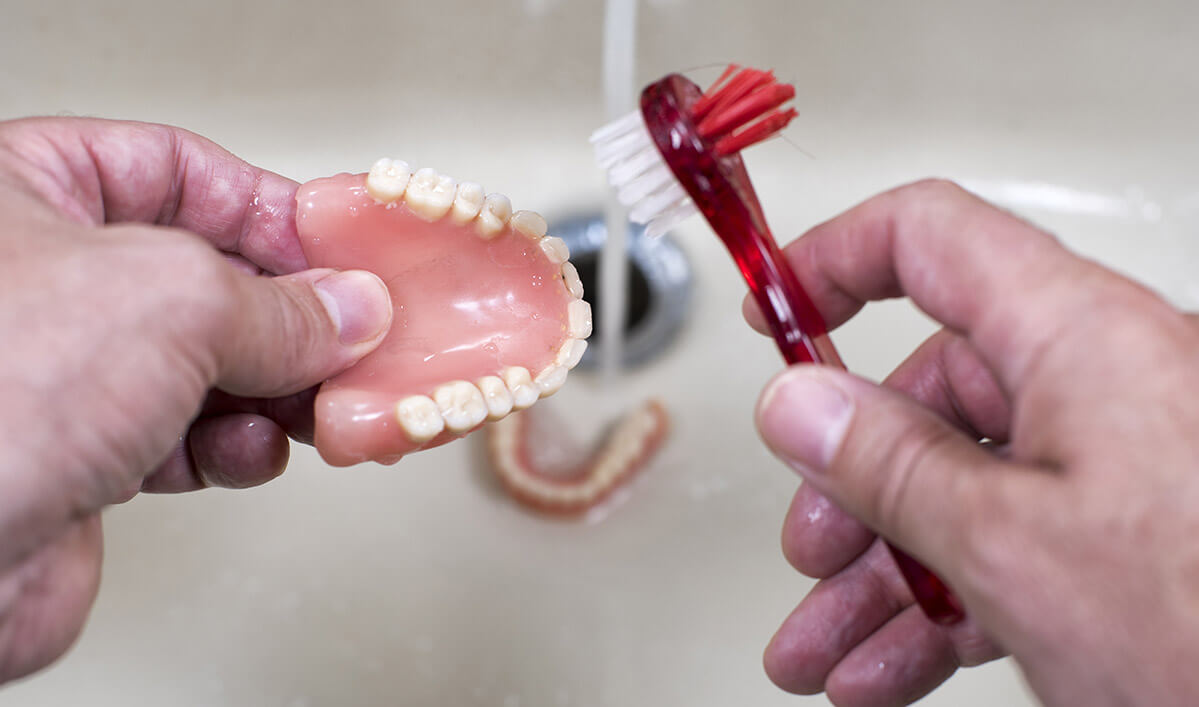
Optimal maintenance of a removable dental prosthesis extends far beyond merely ensuring a clean and aesthetically pleasing appearance. The daily routine for denture care is, in fact, an essential component of overall health, directly influencing the longevity of the appliance itself, the condition of the underlying oral tissues, and even systemic well-being. A casual approach to hygiene, often driven by a misunderstanding of the materials or the mechanics of a prosthesis, can inadvertently create a reservoir for pathogenic microorganisms, leading to chronic inflammation and a cascade of preventable complications. Therefore, understanding the nuanced, best-practice approach to denture maintenance is crucial for all wearers, moving beyond simple rinsing to embrace a thorough, multi-step regimen that preserves both the investment in the dentures and the health of the supportive oral structures.
Brush your dentures twice a day with a stiff brush, using either denture cream or warm soapy water
The mechanical removal of plaque and biofilm is the foundational element of any successful denture hygiene protocol. “Brush your dentures twice a day with a stiff brush, using either denture cream or warm soapy water” encapsulates the critical, non-negotiable step. This process must be performed at least twice daily to dislodge food particles and the sticky, pervasive layer of microbial growth known as denture plaque. Critically, regular toothpaste is a detrimental choice; its abrasive components, designed for the hard enamel of natural teeth, will create microscopic scratches on the softer acrylic or resin of the denture base. These minute fissures serve as ideal retention sites for bacteria and fungi, accelerating the formation of calculus and discoloration. A dedicated, soft-bristled denture brush—which is often larger and specifically shaped to access all surfaces—combined with a non-abrasive denture cleanser, mild hand soap, or even plain warm water, provides the necessary cleaning power without damaging the prosthetic surface. Rinsing after every meal is also advised to prevent food debris from hardening and embedding itself beneath the appliance.
Avoid brushing with toothpaste, as it is quite abrasive and will scratch dentures
The common habit of using standard dental paste on a denture is one of the most frequently observed and counterproductive mistakes in daily care. “Avoid brushing with toothpaste, as it is quite abrasive and will scratch dentures” serves as a vital caution against this damaging practice. The resulting scratches, while invisible to the naked eye, drastically increase the surface roughness of the denture material. This roughened texture not only dulls the polish but, more significantly, provides an enhanced environment for bacterial adhesion, making subsequent cleaning less effective. Over time, this leads to faster build-up of plaque, increased staining, and ultimately, a more rapid deterioration of the prosthesis’s integrity and fit. The cumulative damage from abrasive cleaning shortens the functional lifespan of the denture, often necessitating costly relines or replacements sooner than would otherwise be required.
Leave them out at night
The continuous, uninterrupted wearing of a denture is a practice that directly compromises the health of the oral mucosa and underlying bone. “Leave them out at night” is a directive rooted in the physiological need of the oral tissues to rest and recuperate. The oral mucosa, or gum tissue, under a denture is subjected to constant pressure, reduced salivary flow, and a perpetually warm, moist environment—an ideal setting for fungal and bacterial proliferation. Removing the appliance for a continuous period, ideally six to eight hours overnight, allows the blood circulation to the stressed tissues to normalize, reducing the risk of chronic inflammation. This period of rest is essential for preventing denture stomatitis—a common inflammatory condition marked by redness and swelling beneath the denture—and it helps to minimize the rate of alveolar ridge resorption, the gradual loss of jawbone that naturally occurs after tooth loss and is accelerated by constant denture pressure.
Soaking them in a cleaning solution overnight helps keep them fresh and free from bacteria
The immersion phase of denture care, typically coinciding with the overnight rest period, is crucial for disinfection and hydration. “Soaking them in a cleaning solution overnight helps keep them fresh and free from bacteria” highlights the dual purpose of this practice. Dentures must remain moist when not in the mouth to prevent the acrylic from drying out, which can cause warping and a change in shape, thereby compromising the fit. Soaking in plain water achieves hydration, but immersing the appliance in a dedicated effervescent denture cleaning tablet solution provides a chemical cleansing action. These solutions contain agents that help break down the organic matrix of the biofilm and kill residual microorganisms, including Candida albicans, the fungus responsible for thrush. It is imperative to use water that is at room temperature; hot or boiling water must be avoided at all costs, as the elevated temperature can irreversibly distort the plastic material of the denture base.
Dentures need to be kept moist so they don’t dry out or lose their shape
The physical integrity and fit of the prosthesis are fundamentally dependent on its moisture level. “Dentures need to be kept moist so they don’t dry out or lose their shape” emphasizes a simple yet often overlooked principle of material science in prosthetics. The polymers used to construct dentures are designed to be stable within a hydrated environment. Allowing them to desiccate, even for a short time, can induce dimensional changes that, while minor, are enough to disrupt the precise fit against the underlying tissues. An ill-fitting denture is not merely uncomfortable; it is a mechanism for causing chronic trauma, leading to persistent sore spots, accelerated bone loss, and increased risk of infection, compounding the necessity of constant hydration when the appliance is not being worn.
Over time, ill-fitting dentures can also contribute to jawbone deterioration and long-term oral health problems
The continuous interaction between the denture base and the oral cavity means that poor fit has serious, long-term physiological consequences. “Over time, ill-fitting dentures can also contribute to jawbone deterioration and long-term oral health problems” draws attention to the structural risk. The jawbone, or alveolar ridge, requires functional stimulation to maintain its density. When a denture fits poorly, it distributes chewing forces unevenly, often creating focal areas of excessive pressure while failing to provide adequate, healthy stimulation elsewhere. This leads to an accelerated process of bone resorption (loss), fundamentally altering the facial structure and making subsequent refitting or the potential use of dental implants significantly more challenging. Regular dental check-ups are thus vital not just for the denture itself, but for monitoring the underlying bone and soft tissue health.
Patients can also chew with both sides of the mouth to prevent the dentures from moving forward uncomfortably
Adapting to eating with a new or relined denture involves mastering a specific technique to ensure stability and efficiency. “Patients can also chew with both sides of the mouth to prevent the dentures from moving forward uncomfortably” provides a practical, mechanical solution for managing the forces of mastication. Chewing food simultaneously on both sides of the mouth, rather than favoring one side, helps to equalize the pressure applied to the denture base. This bilateral pressure prevents the seesaw-like tipping and movement that can cause the appliance to dislodge, irritate the gums, or create embarrassing situations. New wearers are often advised to start with softer foods cut into smaller pieces, gradually reintroducing firmer items and always consciously distributing the load across both sides of the arch.
Poor denture hygiene is linked to increased risk of: Cardiovascular disease. Respiratory infections (from inhaling bacteria-laden particles)
The consequences of neglected denture care are not confined to the mouth; they extend to systemic health with potentially serious implications. “Poor denture hygiene is linked to increased risk of: Cardiovascular disease. Respiratory infections (from inhaling bacteria-laden particles)” highlights the connection between oral and general well-being. The microbial biofilm that colonizes an uncleaned denture contains pathogenic bacteria that can be aspirated into the lungs, especially during sleep, increasing the risk for aspiration pneumonia—a particularly serious concern for elderly or immunocompromised individuals. Furthermore, the chronic low-grade inflammation in the mouth caused by poor hygiene and ill-fitting appliances introduces inflammatory markers and bacteria into the bloodstream, which is implicated in the progression of systemic conditions such as cardiovascular disease, reinforcing the idea that denture care is a public health issue.
The long-term health implications of ill-fitting dentures
The gradual, cumulative damage caused by an improperly fitting prosthesis results in a host of chronic issues that severely diminish quality of life. “The long-term health implications of ill-fitting dentures” serves as a stark warning about the secondary effects. Beyond the mechanical trauma and accelerated bone loss, a poor fit can lead to chronic digestive problems because food is not being properly broken down, potentially causing malnutrition. Speech can become impaired due to constant movement or instability, leading to social discomfort and avoidance. Regular professional assessment and adjustment, or “reline,” is not a luxury but a necessary prophylactic measure against these pervasive long-term functional and social disabilities.
Never put dentures in hot water, which can make them warp
As a final, definitive rule on handling the prosthesis, a simple yet critical temperature constraint must be adhered to. “Never put dentures in hot water, which can make them warp” is a clear, concise instruction that protects the physical form of the appliance. Acrylic resin, the primary material for most denture bases, is thermoplastic and susceptible to distortion when exposed to high temperatures, such as boiling water. This warping, even if minor, destroys the precise fit engineered by the dental professional, rendering the denture ineffective, uncomfortable, and potentially damaging to the oral tissues, immediately voiding the care and effort put into its design and fabrication.
